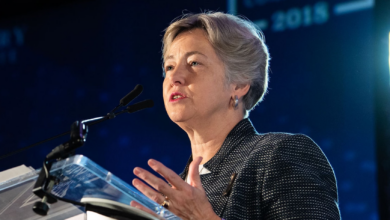
Houston Methodist Congregation Will Continue To Embrace LGBTQ Folks
The United Methodist Church voted to condemn homosexuality, but Bering doubles down on its support for inclusion.

Members of Bering Memorial United Methodist Church packed their bags and headed to St. Louis on February 22, hopeful that the 2019 United Methodist General Conference would call for the denomination to finally become LGBTQ-affirming.
On the bus ride north, the Houston-based group sang hymns, prayed, and prepared to advocate for marginalized folks within the United Methodist Church. Bering, a congregation that has embraced queer people since the early ’80s, was among several groups at the conference pushing for the United Methodist Church to allow same-sex marriages and ordain LGBTQ pastors.

Rev. Diane McGehee, Bering’s pastor, recorded live videos on social media to update members who were following the conference proceedings. When she arrived at the meeting, McGehee went online to address her church back home. Nearly 70 percent of Bering’s 500 members identify as as LGBTQ.
“I love you all and I know that God is with us,” McGehee shared on Bering’s Facebook page. “We’re going to trust God that no matter what happens, God is going to honor our stance of love for all people.”
Throughout the conference, Bering’s timeline displayed videos of McGehee praying, worship services, and testimonials from LGBTQ and other leaders in the United Methodist Church.
“I support this motion to put this before the judicial council, so that we together can make a decision for the church,” openly gay New York delegate JJ Warren stated, “hopefully one that ensures wherever we are, the United Methodist Church continues and allows people to feel their calling that God has put on their heart, no matter whom they love.”
“As a United Methodist clergyperson, I ask forgiveness from the LGBTQIA+ community for the harm that we have caused. Bering is with you, and if there is anything that we can do to support you, we are here.”
However, there were several higher-ups who spoke against the move toward LGBTQ-inclusion—with the global church’s African delegation being nearly unanimous in its opposition.
“If we bring this virus into our church, it will bring illness to us all,” countered Rev. Thomas Berlin of Virginia.
On February 24, the conference took a turn in opposition of LGBTQ folks by voting against the proposed One Church Plan, which would have allowed individual churches to decide how they handle issues of same-sex weddings and the sexuality of their clergy. On February 26, the church finally decided to pass the Traditional Plan and retain existing church policy stating that “homosexuality is incompatible with Christian teaching.”
“Will Bering stop being a safe place for LGBTQ folks?” and “Will it stop being accepting of the entire community?” are some of the questions that Bering members asked McGehee.
A split within the United Methodist Church is now looming. McGehee says that regardless of the decision, Bering will continue to support and serve LGBTQ individuals.
“I do not yet know what the future of Bering is, or what it will look like in terms of structure or affiliation to the United Methodist Church,” McGehee told OutSmart. “I can say that Bering will continue to be fully inclusive and celebratory of all folks—and in this moment, particularly the LGBTQIA+ community.”

Bering was established in 1848 by German-speaking immigrants who were not welcomed in other places of worship. The church was originally situated at Milam and McKinney streets in downtown Houston, before moving to Montrose in 1926.
After many LGBTQ Houstonians moved to Montrose in the 1960s and ’70s, the church’s administrative board decided that everyone would be welcomed without discrimination or prejudice. In 1991, Bering’s membership voted to become a part of the Reconciling Ministries Network, a Methodist group that seeks justice for LGBTQ people.
Anti-LGBTQ regulations were added into the United Methodist Book of Discipline in 1972. In 2016, a debate to remove those rules dominated the church’s General Conference, which occurs every four years. And in St. Louis last month, church leaders ultimately chose to continue to exclude queer folks from full participation in the church.
“As a United Methodist clergyperson, I ask forgiveness from the LGBTQIA+ community for the harm that we have caused,” McGeHee says. “Bering is with you, and if there is anything that we can do to support you, we are here.”
For more information about Bering, visit beringumc.org.
This article appears in the March 2019 edition of OutSmart magazine.










